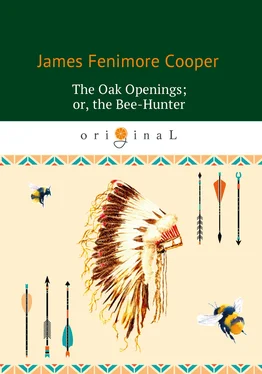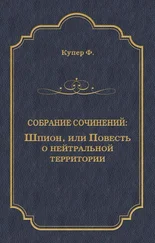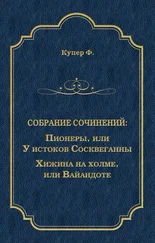Джеймс Фенимор Купер - The Oak Openings; or the Bee-Hunter
Здесь есть возможность читать онлайн «Джеймс Фенимор Купер - The Oak Openings; or the Bee-Hunter» — ознакомительный отрывок электронной книги совершенно бесплатно, а после прочтения отрывка купить полную версию. В некоторых случаях можно слушать аудио, скачать через торрент в формате fb2 и присутствует краткое содержание. Город: Москва, Год выпуска: 2018, ISBN: 2018, Жанр: Исторические приключения, Прочие приключения, Прочие приключения, literature_19, foreign_prose, foreign_adventure, на английском языке. Описание произведения, (предисловие) а так же отзывы посетителей доступны на портале библиотеки ЛибКат.
- Название:The Oak Openings; or the Bee-Hunter
- Автор:
- Жанр:
- Год:2018
- Город:Москва
- ISBN:978-5-521-06660-5
- Рейтинг книги:5 / 5. Голосов: 1
-
Избранное:Добавить в избранное
- Отзывы:
-
Ваша оценка:
- 100
- 1
- 2
- 3
- 4
- 5
The Oak Openings; or the Bee-Hunter: краткое содержание, описание и аннотация
Предлагаем к чтению аннотацию, описание, краткое содержание или предисловие (зависит от того, что написал сам автор книги «The Oak Openings; or the Bee-Hunter»). Если вы не нашли необходимую информацию о книге — напишите в комментариях, мы постараемся отыскать её.
The Oak Openings; or, The Bee Hunter focuses on the activities of professional honey-hunter Benjamin Boden, nicknamed “Ben Buzz”. The novel is set in Kalamazoo, Michigan’s Oak Opening, a wooded prairie during the War of 1812.
The Oak Openings; or the Bee-Hunter — читать онлайн ознакомительный отрывок
Ниже представлен текст книги, разбитый по страницам. Система сохранения места последней прочитанной страницы, позволяет с удобством читать онлайн бесплатно книгу «The Oak Openings; or the Bee-Hunter», без необходимости каждый раз заново искать на чём Вы остановились. Поставьте закладку, и сможете в любой момент перейти на страницу, на которой закончили чтение.
Интервал:
Закладка:
“Never mind me, Bourdon – set me to do anything in which you think I can be of use!” exclaimed the girl, eagerly.
“Well then, Margery, you may do this: come with me to the large tree in the centre of the marsh, and I will set you on a duty that may possibly save my life. I will tell you my meaning when there.”
Margery followed with a light, impatient step; and, as neither stopped to speak or to look around, the two soon stood beneath the tree in question. It was a large elm that completely overshadowed a considerable extent of firm ground. Here a full and tolerably near view could be had of the hut, which was still illuminated by the blazing fire within. For a minute both stood silently gazing at the strange scene; then le Bourdon explained to his companion the manner in which she might assist him.
Once at the elm, it was not so difficult to find the way across the marsh, as it was to reach that spot, coming FROM the chiente. As there were several elms scattered about in the centre of the marsh, the bee-hunter was fearful that he might not reach the right tree; in which case he would be compelled to retrace his steps, and that at the imminent hazard of being captured. He carried habitually a small dark lantern, and had thought of so disposing of it in the lower branches of this very elm, as to form a focus of it, but hesitated about doing that which might prove a guide to his enemies as well as to himself. If Margery would take charge of this lantern, he could hope to reap its advantages without incurring the hazard of having a light suspended in the tree for any length of time. Margery understood the lessons she received, and promised to obey all the injunctions by which they were accompanied.
“Now, God bless you, Margery,” added the bee-hunter. “Providence has brought me and your brother’s family together in troublesome times; should I get back safe from this adventure, I shall look upon it as a duty to do all I can to help Gershom place his wife and sister beyond the reach of harm.”
“God bless you, Bourdon!” half whispered the agitated girl. “I know it is worth some risk to save a human life, even though it be that of an Injin, and I will not try to persuade you from this undertaking; but do not attempt more than is necessary, and rely on my using the lantern just as you have told me to use it.”
Those young persons had not yet known each other a single day, yet both felt that confidence which years alone, in the crowds of the world, can ordinarily create in the human mind. The cause of the sympathy which draws heart to heart, which generates friendships, and love, and passionate attachments, is not obvious to all who choose to talk of it. There is yet a profound mystery in our organization, which has hitherto escaped the researches of both classes of philosophers, and which it probably was the design of the Creator should not be made known to us until we draw nearer to that great end which, sooner or later, is to be accomplished in behalf of our race, when “knowledge will abound,” and we shall better understand our being and its objects, than is permitted to us in this our day of ignorance. But while we cannot trace the causes of a thousand things, we know and feel their effects. Among the other mysteries of our nature is this of sudden and strong sympathies, which, as between men for men, and women for women, awaken confidence and friendship; and as between those of different sexes, excite passionate attachments that more or less color their future lives. The great delineator of our common nature, in no one of the many admirable pictures he has drawn of men, manifests a more profound knowledge of his subject, than in that in which he portrays the sudden and nearly ungovernable inclination which Romeo and Juliet are made to display for each other; an inclination that sets reason, habit, prejudice, and family enmities at defiance. That such an attachment is to be commended, we do not say; that all can feel it, we do not believe; that connections formed under its influence can always be desirable, we are far from thinking: but that it may exist we believe is just as certain as any of the incomprehensible laws of our wayward and yet admirable nature. We have no Veronese tale to relate here, however, but simply a homely legend, in which human feeling may occasionally be made to bear an humble resemblance to that world-renowned picture which had its scenes in the beautiful capital of Venetian Lombardy.
When le Bourdon left his companion, now so intensely interested in his success, to pick his way in the darkness across the remainder of the marsh, Margery retired behind the tree, where the first thing she did was to examine her lantern, and to see that its light was ready to perform the very important office which might so speedily be required of it. Satisfied on this point, she turned her eyes anxiously in the direction of the hut. By this time every trace of the bee-hunter was lost, the hillock in his front forming too dark a background to admit of his being seen. But the fire still blazed in the chiente, the savages not having yet finished their cooking, though several had satisfied their appetites, and had already sought places where they might stretch themselves for the night. Margery was glad to see that these last individuals bestowed themselves within the influence of the fire, warm as was the night. This was done most probably to escape from the annoyance of the mosquitos, more or less of which are usually found in the low lands of the new countries, and near the margins of rivers.
Margery could distinctly see the Chippewa, erect and bound to his tree. On him she principally kept her looks riveted, for near his person did she expect first again to find the bee-hunter. Indeed, there was no chance of seeing one who was placed beneath the light of the fire, since the brow of the acclivity formed a complete cover, throwing all below it into deep shade. This circumstance was of the greatest importance to the adventurer, however, enabling him to steal quite near to his friend, favored by a darkness that was getting to be intense. Quitting Margery, we will now rejoin le Bourdon, who by this time was approaching his goal.
The bee-hunter had some difficulty in finding his way across the marsh; but floundering through the impediments, and on the whole preserving the main direction, he got out on the firm ground quite as soon as he had expected to do. It was necessary for him to use extreme caution. The Indians according to their custom had dogs, two of which had been in sight, lying about half-way between the prisoner and the door of the hut. Boden had seen a savage feeding these dogs; and it appeared to him at the time as if the Indian had been telling them to be watchful of the Chippewa. He well knew the services that the red men expected of these animals, which are kept rather as sentinels than for any great use they put them to in the hunts. An Indian dog is quick enough to give the alarm, and he will keep on a trail for a long run and with considerable accuracy, but it is seldom that he closes and has his share in the death, unless in the case of very timid and powerless creatures.
Nevertheless, the presence of these dogs exacted extra caution in the movements of the bee-hunter. He had ascended the hill a little out of the stream of light which still issued from the open door of the hut, and was soon high enough to get a good look at the state of things on the bit of level land around the cabin. Fully one-half of the savages were yet up and in motion; though the processes of cooking and eating were by this time nearly ended. These men had senses almost as acute as those of their dogs, and it was very necessary to be on his guard against them also. By moving with the utmost caution, le Bourdon reached the edge of the line of light, where he was within ten yards of the captive. Here he placed his rifle against a small tree, and drew his knife, in readiness to cut the prisoner’s thongs. Three several times, while the bee-hunter was making these preparations, did the two dogs raise their heads and scent the air; once, the oldest of the two gave a deep and most ominous growl. Singular as it may seem, this last indication of giving the alarm was of great service to le Bourdon and the Chippewa. The latter heard the growl, and saw two of the movements of the animals’ heads, from all which he inferred that there was some creature, or some danger behind him. This naturally enough induced him to bestow a keen attention in that direction, and being unable to turn body, limbs, or head, the sense of hearing was his only means of watchfulness. It was while in this state of profound listening that Pigeonswing fancied he heard his own name, in such a whisper as one raises when he wishes to call from a short distance with the least possible expenditure of voice. Presently the words “Pigeonswing,” and “Chippewa,” were succeeded by those of “bee-hunter,” “Bourdon.” This was enough: the quick-witted warrior made a low ejaculation, such as might be mistaken for a half-suppressed murmur that proceeded from pain, but which one keenly on the watch, and who was striving to communicate with him, would be apt to understand as a sign of attention. The whispering then ceased altogether, and the prisoner waited the result with the stoic patience of an American Indian. A minute later the Chippewa felt the thongs giving way, and his arms were released at the elbows. An arm was next passed round his body, and the fastenings at the wrist were cut. At this instant a voice whispered in his ear – “Be of good heart, Chippewa – your friend, Bourdon, is here. Can you stand?”
Читать дальшеИнтервал:
Закладка:
Похожие книги на «The Oak Openings; or the Bee-Hunter»
Представляем Вашему вниманию похожие книги на «The Oak Openings; or the Bee-Hunter» списком для выбора. Мы отобрали схожую по названию и смыслу литературу в надежде предоставить читателям больше вариантов отыскать новые, интересные, ещё непрочитанные произведения.
Обсуждение, отзывы о книге «The Oak Openings; or the Bee-Hunter» и просто собственные мнения читателей. Оставьте ваши комментарии, напишите, что Вы думаете о произведении, его смысле или главных героях. Укажите что конкретно понравилось, а что нет, и почему Вы так считаете.












